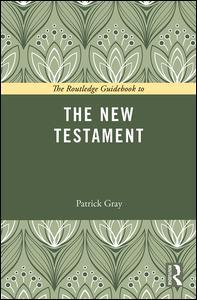The Routledge Guidebook to The New Testament The Routledge Guides to the Great Books Series
Auteur : Gray Patrick

As part of the Christian canon of scripture, the New Testament is one of the most influential works in history. Its impact can be seen in many different fields, but without an awareness of the historical, cultural, social, and intellectual context of early Christianity, it can be difficult for modern-day readers to fully understand what the first-century authors were trying to say and how the first readers of the New Testament would have understood these ideas.
The Routledge Guidebook to the New Testament offers an academic introduction to the New Testament examining:
- The social and historical context in which the New Testament was written
- The primary text, supporting students in close analysis from a range of consensus positions
- The contemporary reception and ongoing influence of the New Testament
With further reading suggestions, this guidebook is essential reading for all students of religion and philosophy, and all those wishing to engage with this important work.
Abbreviations
Introduction
I. The Context of Early Christianity and the New Testament
II. The Literature of the New Testament: The Gospels and the Acts of the Apostles
Mark
Matthew
Luke-Acts
John
III. The Literature of the New Testament: Letters
The Letters of Paul
Romans
1 Corinthians
2 Corinthians
Galatians
Ephesians
Philippians
Colossians
1-2 Thessalonians
The Pastoral Epistles (1-2 Timothy, Titus)
Philemon
The Letter to the Hebrews
The General Epistles
James
1-2 Peter
1, 2, 3 John
Jude
IV. The Literature of the New Testament: Apocalyptic Literature
Revelation
V. Key Concepts
VI. General Issues
What do we know about the life of Jesus?
What language did Jesus speak?
How do we know what Jesus really said?
How should the miracles in the New Testament be understood?
Did Jesus found a new religion?
Is the New Testament anti-Semitic?
Who wrote the New Testament?
How do we know when the books of the New Testament were written?
Why does the New Testament contain (only) twenty-seven books?
How should one read the non-canonical writings?
How are the Dead Sea Scrolls related to the New Testament?
Should the New Testament be read "literally"?
What special methods do scholars use to interpret the New Testament?
VII. For Further Study
Bibliography
Index
Patrick Gray is Associate Professor of Religious Studies at Rhodes College.
Date de parution : 03-2017
12.9x19.8 cm
Date de parution : 03-2017
12.9x19.8 cm
Thème de The Routledge Guidebook to The New Testament :
Mots-clés :
Follow; early Christianity; Young Man; Opening Paul’s Letters: A Reader’s Guide to Genre and Interpretation; Synoptic Gospels; Genre; Common Language; Purpose; Household Code; Argument; Antichrist; Structure; Synoptic Problem; Rhetoric; Dead Sea Scrolls; The Context of Early Christianity and the New Testament; Timeless; The Literature of the New Testament; Historical Jesus; The Gospels and the Acts of the Apostles; Canonical Gospels; Key Concepts; Empty Tomb; Judaism and Christianity; Fourth Gospel; The Hellenistic Heritage; Pastoral Epistles; Roman Realities; Undisputed Letters; The Literary Milieu; Paul’s Ministry; Matthew; Intact Letter; Mark; Seventh Seal; Luke; Pauline Authorship; John; Non-canonical Writings; the historical Jesus; Lord’s Day; oral traditions; Apocalyptic Genre; the Synoptic Problem; Adolf Hitler; Aristotle Poetics; Multifarious Body; reception history; Christological Images; The Letters of Paul; The Undisputed Letters; Romans; Corinthians; Galatians; Philippians; Thessalonians; Philemon; The Disputed Letters; Ephesians; Timothy; Titus; The Letter to the Hebrews; The General Epistles; James Peter Jude; The Book of Revelation; Messiah; Parousia; Eschatology; Syncretism; Paraenesis; Redaction Criticism; Form Criticism; Source Criticism; Septuagint; Sheol; Christology; Textual Variant; Kerygma; Gnosticism; Messianic Secret; Glossolalia; anti-semitic; Greeks and Romans; Raymond Brown An Introduction to the New Testament; Bart D Ehrman; The New Testament: A Historical Introduction to the Early Christian Writings; Luke T; Johnson; The Writings of the New Testament: An Interpretation; Stephen L; Harris The New Testament: A Student's Introduction; Pheme Perkins Reading the New Testament: An Introduction; Luke T; Johnson The New Testament: A Very Short Introduction; Kyle Keefer; The New Testament as Literature: A Very Short Introduction; W; R; Telford The New Testament: A Short Introduction; Carson Moo Naselli; Introducing the New Testament: A Short Guide to Its History and Message



